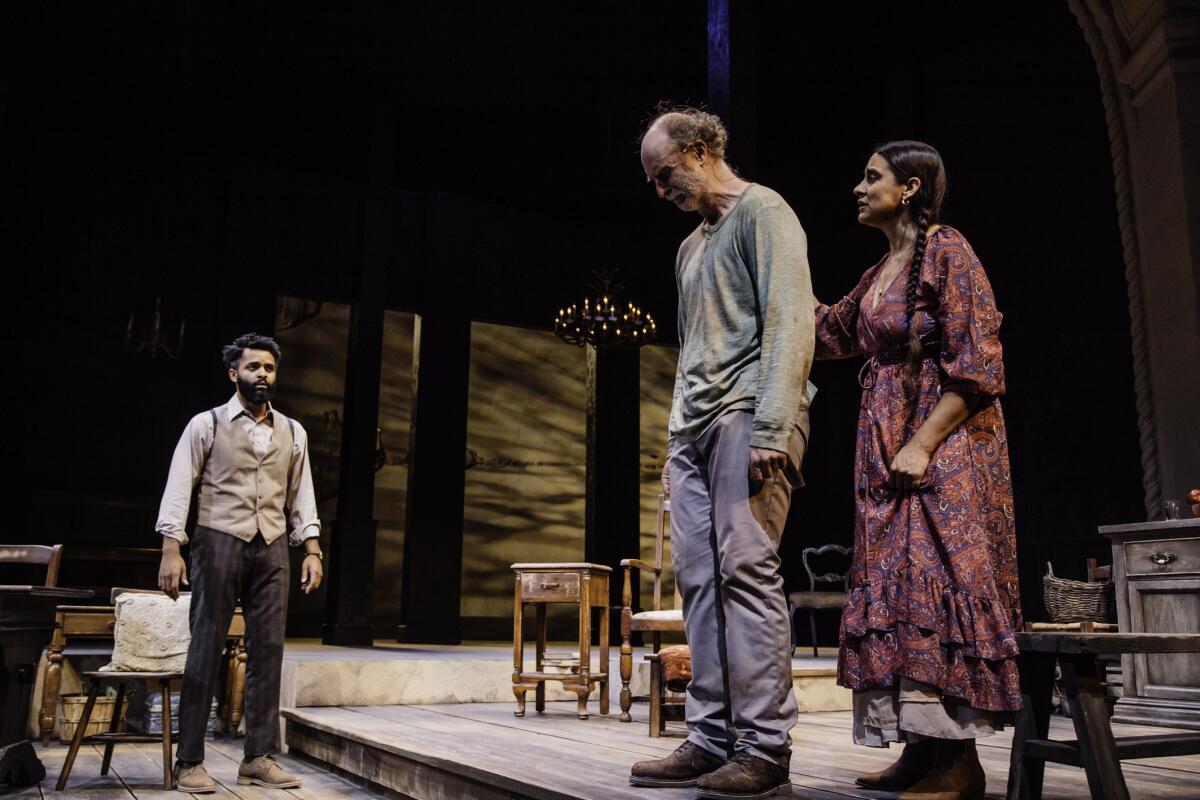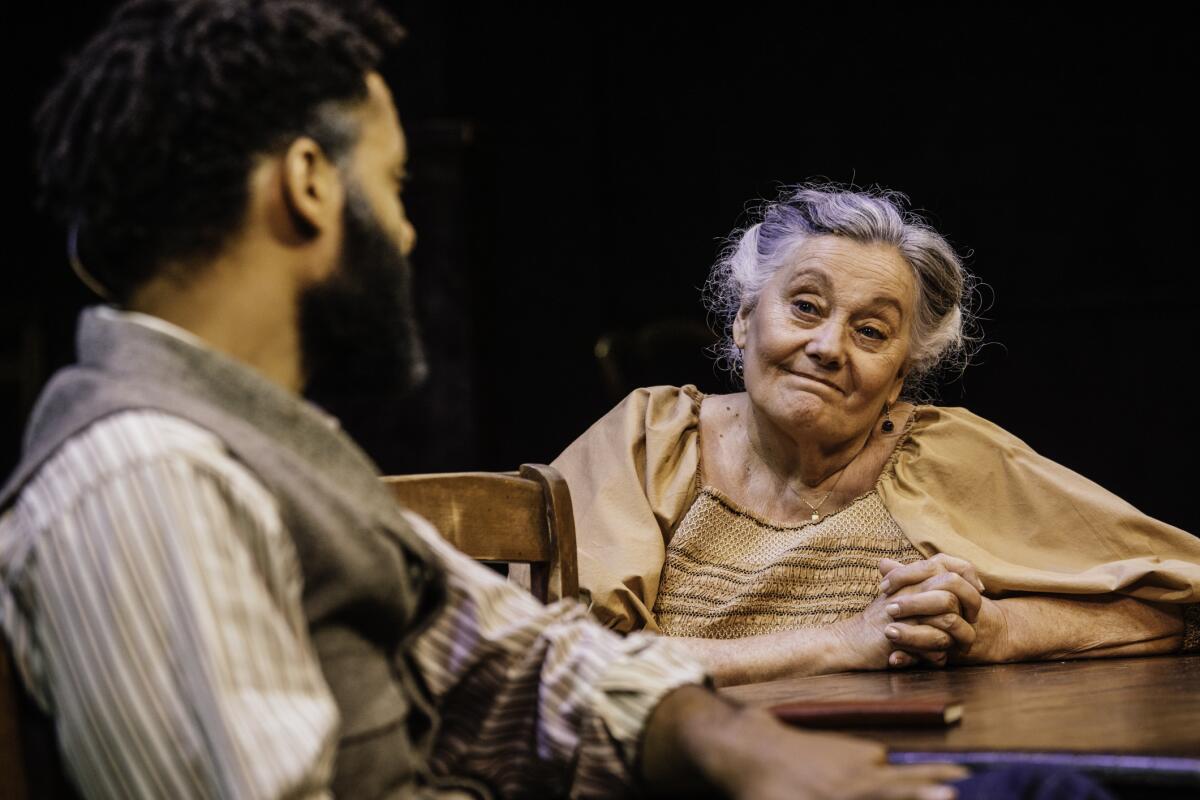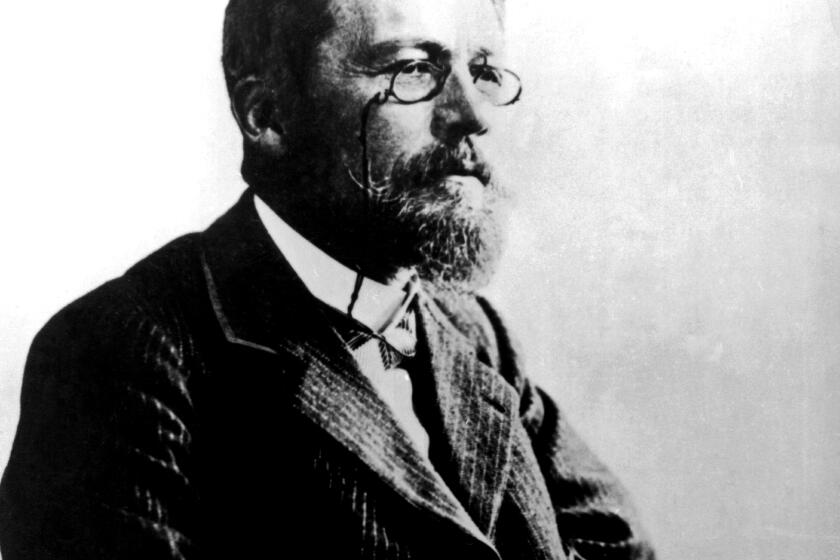Review: A renewed ‘Uncle Vanya’ at Pasadena Playhouse shines with unforced naturalism

- Share via
Uncle Vanya may be the title character, but he’s not the hero of Anton Chekhov’s play. There are no heroes in “Uncle Vanya,” only human beings who are lovable — not only despite their imperfections but also because of them.
Michael Michetti’s production, which opened last weekend at Pasadena Playhouse, doesn’t soften the edges of the personalities that are smashing into one another, bumper-car-style. These “scenes from country life,” as the play is subtitled, are full of vexation, longing, frustration and endless complaints of boredom.
All hell has broken loose at the family estate managed by Vanya, a middle-aged man wallowing in regret, and his unmarried niece, Sonya, ever since Sonya’s retired professor father, Serebryakov, has arrived with his beautiful and much younger second wife, Elena. Vanya falls madly in love with her. Astrov, a doctor with a passion for forest preservation and vodka, is more lustily aroused, to the chagrin of poor Sonya, whose heart is devoted to him.
This daisy chain of desire leaves everyone at a loss, but it’s not until Serebryakov proposes that the estate be put up for sale that Vanya, feeling betrayed by the callousness of his brother-in-law, reaches for a gun. But this being tragicomedy and Vanya being a lousy marksman, the play doesn’t veer into tragedy. The laughter, however, subsides into something more somber and spiritual.
This translation of “Uncle Vanya,” a collaboration between playwright Richard Nelson and the veteran team of Richard Pevear and Larissa Volokhonsky, had its premiere in a magnificent production at San Diego’s Old Globe in 2018 that Nelson directed himself. There, audience members had the option of wearing listening devices to intensify the eavesdropping effect of the intimate staging.
Michetti’s commendable if not quite settled production is more traditional in its theatricality. The stage has been extended into the theater to create greater proximity to the audience, and the actors strive for naturalism, but the whispering quality that Nelson achieved isn’t feasible in this grander space.
Still, the ensemble is at its best when actors are reacting to one another — when they’re behaving rather than performing. The roles aren’t all thoroughly worked out and the truncated script creates holes that the actors here aren’t able to patch over, but the fluctuating relationships of the characters make for gripping drama.
Anton Chekhov’s influence is seen in the Oscar-winning film “Drive My Car” and recent novels by Gary Shteyngart and Rachel Cusk. And stage productions, including a new “Uncle Vanya” at Pasadena Playhouse, are revealing just how collaboratively open his plays can be.
As Vanya, Hugo Armstrong, looking like he just rolled out of bed, offers a performance of marvelous spontaneity. The text, spoken in ironic asides, sounds like subtext when it comes out of his mouth. Indeed, every uttered word measures the gap between who this Vanya would like to be and who he actually is.
There’s no attempt to ennoble the character. When Vanya is alone with Astrov (Brandon Mendez Homer), their banter has a locker-room vibe. Goatishly gazing at Elena (Chelsea Yakura-Kurtz), Armstrong’s Vanya is clearly not after a marriage of true minds.
Furious at Serebryakov (Brian George) for casually announcing the sale of an estate he has sunk his money and life into, Vanya wailingly shouts that he could have become a Schopenhauer or a Dostoevsky had he not been so stupidly self-abnegating. But this Vanya clearly doesn’t believe a word he’s saying. Armstrong’s realism is breathtaking, but the boorish interpretation of the character has a distorting influence on the play.
Unlike Jay O. Sanders’ portrayal of Vanya in the 2018 premiere of this translation, there’s little sense that Vanya and Elena have a soulful connection. Sanders’ Vanya was touched to the quick by Elena’s beauty. The leering of Armstrong’s Vanya stays on the surface.
Yakura-Kurtz, a replacement for another actor, is seductive in a way that doesn’t always feel deeply inhabited. Part of the problem is the age difference between her character and Armstrong’s Vanya. Elena isn’t moved by Vanya because she never for a moment takes him seriously as a lover.
The chemistry between Yakura-Kurtz’s Elena and Mendez Homer’s ardent Astrov is not only more sexually alive — it seems to have a good deal more depth. This imbalance robs Vanya’s devastation of its emotional weight.
Sabina Zúñiga Varela’s performance as Sonya is the most strikingly original in the production. This young woman whom Astrov admires but cannot passionately love is unsentimentally endowed with a strength and intelligence grounded in Chekhov’s forgiving wisdom.

Although she’s not given much to do, the astringent Anne Gee Byrd lends Marya, Vanya’s bluestocking mother, a feisty, antagonistic presence. Jayne Taini deserves a Stanislavsky Award for her embodiment of Marina, the old nurse who lovingly attends to all these colicky adults.
I once taught a playwright class in which we read “Uncle Vanya” strictly through the eyes of Marina, a subordinate character who proves Stanislavski’s dictum that there are no small parts, only small actors. Taini conveyed for me the holy substance of this beautiful play.
Tesshi Nakagawa’s scenic design focuses attention on the handsome downstage dining area. Unfortunately, the geography of the upstage area is sketchy, causing some blurriness in the blocking. Wendell C. Carmichael’s costumes fail to create a coherent theatrical world.
So, not an ideal “Uncle Vanya” by any stretch, but a worthy one. In fact, I’d happily see it again to discover how the acting dynamics deepen as they always seem to do in Chekhov.
'Uncle Vanya'
Where: Pasadena Playhouse, 39 S. El Molino Ave., Pasadena
When: 8 p.m. Wednesdays-Fridays, 2 and 8 p.m. Saturdays, 2 p.m. Sundays
Tickets: Start at $30
Contact: (626) 356-7529 or pasadenaplayhouse.org
Running time: 2 hours, 20 minutes (including one intermission)
More to Read
The biggest entertainment stories
Get our big stories about Hollywood, film, television, music, arts, culture and more right in your inbox as soon as they publish.
You may occasionally receive promotional content from the Los Angeles Times.












